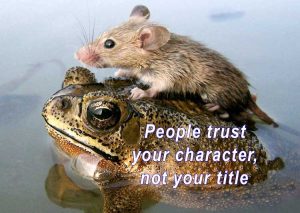Trusted leaders wanted
The conventional practice of management to drive results at any costs is ruled out. Managers used to be hard on employees, suppress them, scare them and get work out of them. Today the scene has changed. Managers need to strike a friendlier cord with their subordinates. They are aware of their subordinate’s personal lives, their hobbies, their hidden talents so that their personal and professional lives don’t collide. Today’s workplace atmosphere calls for an evolved way of management and of leadership. Today’s managers have to be good human first to get the best performance from his subordinates. Today’s manager needs to motivate and inspire his team to get the best out of his team members.
Nobody can stand an obsessive, insecure, complicated and fiddly manager. People don’t leave organizations, they leave persons. No one likes to work with a ‘self obsessed’ manager; someone who says ‘I am so and so’, ‘I like so and so’, ‘this is my vision’, ‘that is my intention’ so on and forth. Instead of ‘me’ manager employees like a ‘we’ manager. A leader who can accommodate others is appreciated highly. Being human is no more considered a sign of vulnerability; it’s a mark of strong leadership. Employees are first human beings. Organizations must acknowledge this fact and hire managers who understand other’s emotions. We cannot underestimate social emotions; they are most crucial for success. And, the most vital emotion at work place is empathy.
Leaders who want to be in control all the time get frustrated when their team looks up to them for answers and solutions. And, if they display any limitation or waver in their decision, the chances are the whole organization can crumble around them. Perfectionism and insecurity makes the leaders terribly anxious. Also a fixated manager always remains anxious. We should remember that even subordinates can see the strengths and weaknesses of their superiors. Despite some weaknesses if the managers function well, if they can handle tough situations without much fuss the subordinates support him/her quietly.
Clearly, some training and development needs are universal. Some traits of leadership can be taught but some are to be innate. It’s still not scientifically proved whether leaders are born or they can be developed.
A good leader understands that each member in his team is unique: each one has different skills, different levels of understanding, and is fit to take on different responsibilities and objectives. Thus the business world, political world, social world requires trained, well mannered and mature leaders. The academia needs to take on the responsibility of training and developing effective leaders. When we say academia more emphasis is stressed on business schools which can play a big role in developing trusted leaders.
Organizations today seek collaborative thinkers who are cooperative and can solve problems. At B-Schools too much of emphasis is laid on developing analysts who are good at applying quantitative management formulas. The narrowly designed specializations corrupt minds of the students; they lose the ability of looking at problems from totality. Companies demand leaders who can powerfully coherent ideas, both orally and in writing. Companies look at leadership traits that can motivate and guide their people. But business schools tend to train people to simply assert their ideas. We are trailing out on the importance of understanding and empathizing emotions. Working with our own and other’s emotions seems very difficult. Another thing is sensitizing the students to the real time issues and improving their critical abilities. Excellent communication is equally core area for development.
Can we expect a radical revamp from B schools? No, we can’t until industry and schools compare notes. I think the gap between expectation from the organizations and the skills taught at MBA schools can be shortened if there is a regular dialogue between both.
A 1999 study of MBA graduates conducted by Mark Kretovics who was then assistant dean at Colorado State University’s College of Business and is currently an assistant professor of higher education administration and student personnel in Kent State University’s Department of Teaching Leadership and Curriculum Studies, provides really striking findings. He assessed set of skills among a control group comprising of students from various streams of studies including MBAs. The study proved that out of 12 skill areas in 7 categories MBA graduates were significantly better than the group of university graduates not enrolled in a business program. The seven categories in which MBAs were superior were action, goal setting, information analysis, information gathering, quantitative skills, theory, and technology. However, the MBAs could not outsmart students from other streams in five other equally critical areas: helping others, inventiveness, leadership, affiliation, and wisdom. We see that these deficiencies are widespread among MBA programs in most part of the world.
In a 2002 poll by Canada’s Financial Post, 141 CEOs and senior executives rated non-business-school graduates as far better than MBAs in commitment to hard work, oral communication, written communication, understanding industry analysis, interpersonal skills, and even skills in marketing and sales. B Schools must take their roles seriously.
 The primary task of leadership is giving direction. Leaders must be able to create trustworthiness in their organizations. Trust is the foundation of leadership. In 21st century organizations must transform economy by improving lives, saving the environment and empowering communities. Transformation, environment protection and empowerment all three breed well when there is trust. Organizations have to recognize themselves as social enterprises. The social networking and Internet are educating the people like never before. To face the complexities in the business world well prepared leaders are a must. Most MBA graduates arrive at new jobs unprepared. They should be prepared to work in multicultural, diversified, multiunit organizations.
The primary task of leadership is giving direction. Leaders must be able to create trustworthiness in their organizations. Trust is the foundation of leadership. In 21st century organizations must transform economy by improving lives, saving the environment and empowering communities. Transformation, environment protection and empowerment all three breed well when there is trust. Organizations have to recognize themselves as social enterprises. The social networking and Internet are educating the people like never before. To face the complexities in the business world well prepared leaders are a must. Most MBA graduates arrive at new jobs unprepared. They should be prepared to work in multicultural, diversified, multiunit organizations.
Organizations expect highly motivated, able people with stronger skills who arrive with MBAs. They look for stronger skills in writing, public speaking, building and running teams, supervising and delegating, and sharing leadership in ways that motivate and inspire subordinates. Even if it’s true that social skills are difficult to teach, curriculum can be designed to promote them. Organizations expect MBAs with a better grasp of the scientific method and how to apply it from hypothesis generation through the research and analysis that underlies the MBA profession. Research skills must be taught at the B Schools with precedence.
Business schools mistakenly defer to students when they’re designing their curriculum. They instead try to please students by designing lighter, misleading curriculum. That could explain why MBA programs do not pay enough attention to the nuts and bolts of problem solving.
Another area of concern is there is hardly any stress laid on the quality of being honest and having strong morals and principles. For building successful business ‘integrity’ is a must. A 2007 Bloomberg/LA Times survey reported that 6 out of 10 Americans believed that the CEOs of American companies are not ethical. In 2008 America witnessed the subprime crisis and the economic downhill.
Bad leadership and lack of genuine spirits are not going to take us any further. The base of leadership is integrity and spirit of service. Today we need leaders who can instead of only talking do the walking for transforming the economy. Leadership is a relationship between the person leading a group and group members. As with any relationship, success depends on both parties.
Whether the setting of an organization is business, government, education, entertainment, retail, or it’s an NGO; most people would agree that they would like to work with a good leader. And, a good leader is someone like a good physician. Just as the physician identifies the patient’s disease accurately to ensure effectiveness of the prescribed treatment, the business leader must also be able to diagnose problems, values and voices while finding effective solutions. All said and done, today all organizations are craving for trusted leaders.















































